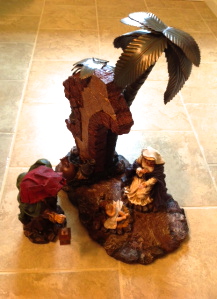“The sweet spot of every person lies at the intersection of our greatest strength and greatest passion.” —Ken Coleman
Has your approach to engage an audience gone awry like a shanked golf ball that speeds away from the cup?
If so, finding the creative sweet spot in your activity will propel your desired result forward.
The sweet spot is the point that creates the most power for the least effort. To visualize this, try the following.
Suspend a golf putter between your forefinger and thumb. Then lightly tap the putterhead on either the toe or the heel. The putterhead turns slightly, but the putter doesn’t swing. Now, tap it where the manufacturer has marked the sweet spot between the toe and the heel. The putter swings like a pendulum, ready to send a ball forward.
3 Examples
1. Connecting with a preschool boy.
At Bible Study Fellowship, a volunteer sat on a chair. She asked a little boy about the car he played with during free play. The boy muttered something as he rolled his car on the rug with pre-printed roads.
She made a connection. But compare it with what I’ve used with preschool boys in several venues. I sit on the floor near the boy. I select another car and a police car. I make my first car speed and then take on the role of the policeman inside my police car. I speak what the policeman thinks and says and sound the police siren as my police car chases my speeding car.
In no time, we’re playing police-chase. Sometimes the boy likes to be the policeman, stopping my speeding car: “You were speeding. Speeding is bad. Here’s a ticket.” I dramatically plead my case, and sometimes I zoom off.
The sweet spot in this case is the dramatic story while entering the boy’s circle of play.
2. Connecting with readers.
 I wrote four “practice” novels. I received nibbles from editors, but the novels lacked one main thing. When I found it, I had two short stories published and landed a book contract. The sweet spot? Writer’s voice.
I wrote four “practice” novels. I received nibbles from editors, but the novels lacked one main thing. When I found it, I had two short stories published and landed a book contract. The sweet spot? Writer’s voice.
Donald Maass says in Writing the Breakout Novel, “By voice, I think they mean not only a unique way of putting words together, but a unique sensibility, a distinctive way of looking at the world, an outlook that enriches an author’s oeuvre.”
After learning other aspects of the craft, I finally had fun and let my inner personality and attitude come through in my writing. Ta-da. My voice.
3. Connecting with young male prisoners.
 When I joined a prison ministry, I felt something was missing in the verbal messages.
When I joined a prison ministry, I felt something was missing in the verbal messages.
For the Christmas lesson, I brought in a large nativity scene, and as I told the story of Jesus’ birth, I arranged different scenes from the pieces: Mary, Joseph, an angel, a stable, animals, infant Jesus, and shepherds. After the story, a wide-eyed young man approached me and wanted to know more.
The sweet spot was the drama of my visual scenes.
∞
Like a golfer uses his putterhead’s sweet spot to send his golf ball to the cup, you can find something creative to move your audience.
What have been sweet spots in your activities?













 RSS - Posts
RSS - Posts